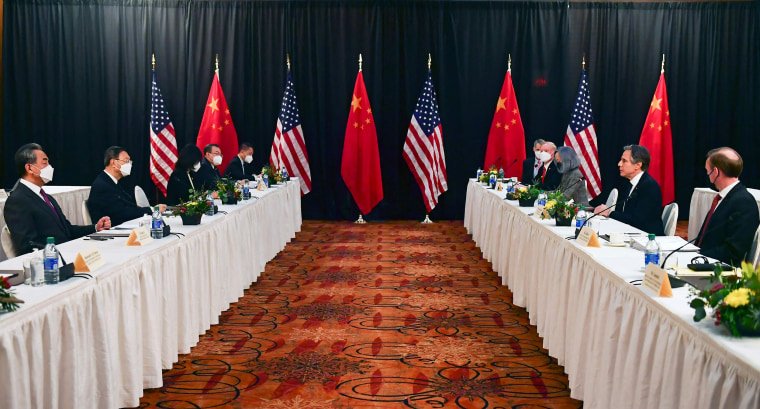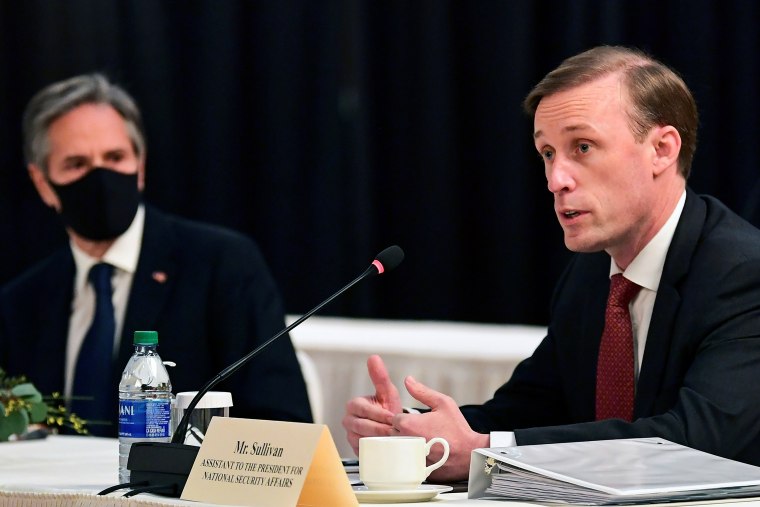Top diplomats from the U.S. and China had a public blowup in front of reporters Thursday as the two global powers met in Alaska to discuss policy and attempt to restore ties that have become increasingly strained in recent years.
Secretary of State Antony Blinken was joined in Anchorage by Jake Sullivan, President Joe Biden’s national security adviser, to meet with their Chinese counterparts, State Councilor Wang Yi and Chinese Communist Party foreign affairs chief Yang Jiechi, for two days of talks in their first face-to-face meetings.
The atmosphere was expected to be tense because days earlier the U.S. had slapped sanctions on China for Beijing's crackdown on political freedoms in Hong Kong. But the contentious on-camera exchanges that followed were a clear departure from the light pleasantries traditionally offered before diplomatic discussions.
Blinken opened his remarks by saying Beijing needed to return to a rules-based system, lambasting China for violating international norms through their crackdown on Uyghurs and other minorities in Xinjiang, cyber attacks against the U.S. and “economic coercion.”
“Each of these actions threaten the rules-based order that maintains global stability," Blinken said. "Our intent is to be direct about our concerns, direct about our priorities, with the goal of a more clear-eyed relationship between our countries moving forward.”
Sullivan added, "We do not seek conflict but we welcome stiff competition, and we will always stand up for our principles for our people, and for our friends."
China’s Yang Jiechi replied with a lengthy lecture against the U.S. that went on for so long the subsequent translation took 17 minutes. According to a senior official, there had been an agreement that each side would speak for two minutes at a photo opportunity before the session began.

"China is firmly opposed to U.S. interference in China's internal affairs. We have expressed our staunch opposition to such interference, and we will take firm actions in response of human rights. We hope that the United States will do better on human rights,” he said, referring to the Black Lives Matter movement in the U.S. “China has made steady progress in human rights."
He added, "And the United States has United States-style democracy. And China has Chinese-style democracy. It is not just up to the American people, but also the people of the world, to evaluate how the United States has done in advancing its own democracy in China's case, after decades of reform and opening up, we have come a long way in various fields."
Blinken then signaled for the news cameras to stay so that he could rebut the criticism of U.S democracy, noting the Chinese officials’ lengthy remarks. Sullivan followed suit. Blinken then attempted to dismiss the press pool but the Chinese officials insisted they be given the chance to offer their own second round.
This spat turned a four-minute photo-op into a diplomatic spat that lasted more than an hour.
A U.S. official told NBC News after the event that the Chinese delegation violated mutually agreed protocol.
“We have continued on with our planned presentation, knowing that exaggerated diplomatic presentations often are aimed at a domestic audience. We still have a lot of business to conduct,” the official said. “We will use the remaining hours to outline for the Chinese delegation in private the same messages we have consistently delivered in public. The Chinese delegation, on the other hand, seems to have arrived intent on grandstanding, focused on public theatrics and dramatics over substance.”
When asked about the grandstanding accusations, China's foreign ministry spokesman, Zhao Lijian, claimed, "It was the United States who provoked and provoked the dispute first. Therefore, the two sides were full of gunpowder and drama in the opening remarks from the beginning. This was not the original intention of the Chinese side."
"China attended the meeting with sincerity and constructive attitude. Alaska is the northernmost state in the United States," he said. "When the members of the Chinese delegation arrived in Alaska, they not only felt the cold weather in Alaska, but also felt the hospitality of the American host."
In the run-up to the meeting in Alaska, the Biden administration sent an unmistakable signal that it would take a tough line with Beijing and back up U.S. allies in Asia.
During a visit to Japan, Blinken warned against "coercion and aggression" by Beijing and vowed that the U.S. would "push back if necessary." Secretary of Defense Lloyd Austin, who joined Blinken for talks with Japanese counterparts in Tokyo, cited China's "destabilizing actions" in the East and South China seas.
Senior administration officials briefing reporters in advance of the Anchorage meetings said they didn't anticipate any policy pronouncements after the meetings, which they described as a one-off, not the beginning of a dialogue process with the Chinese. And they said there would be no joint statement from the two countries afterward, though such statements are customary for high-level diplomatic talks.
Instead, they said the goal was to get a sense of where the Chinese stand on key issues so they can take stock once returning home as Biden finalizes his broader China strategy.


